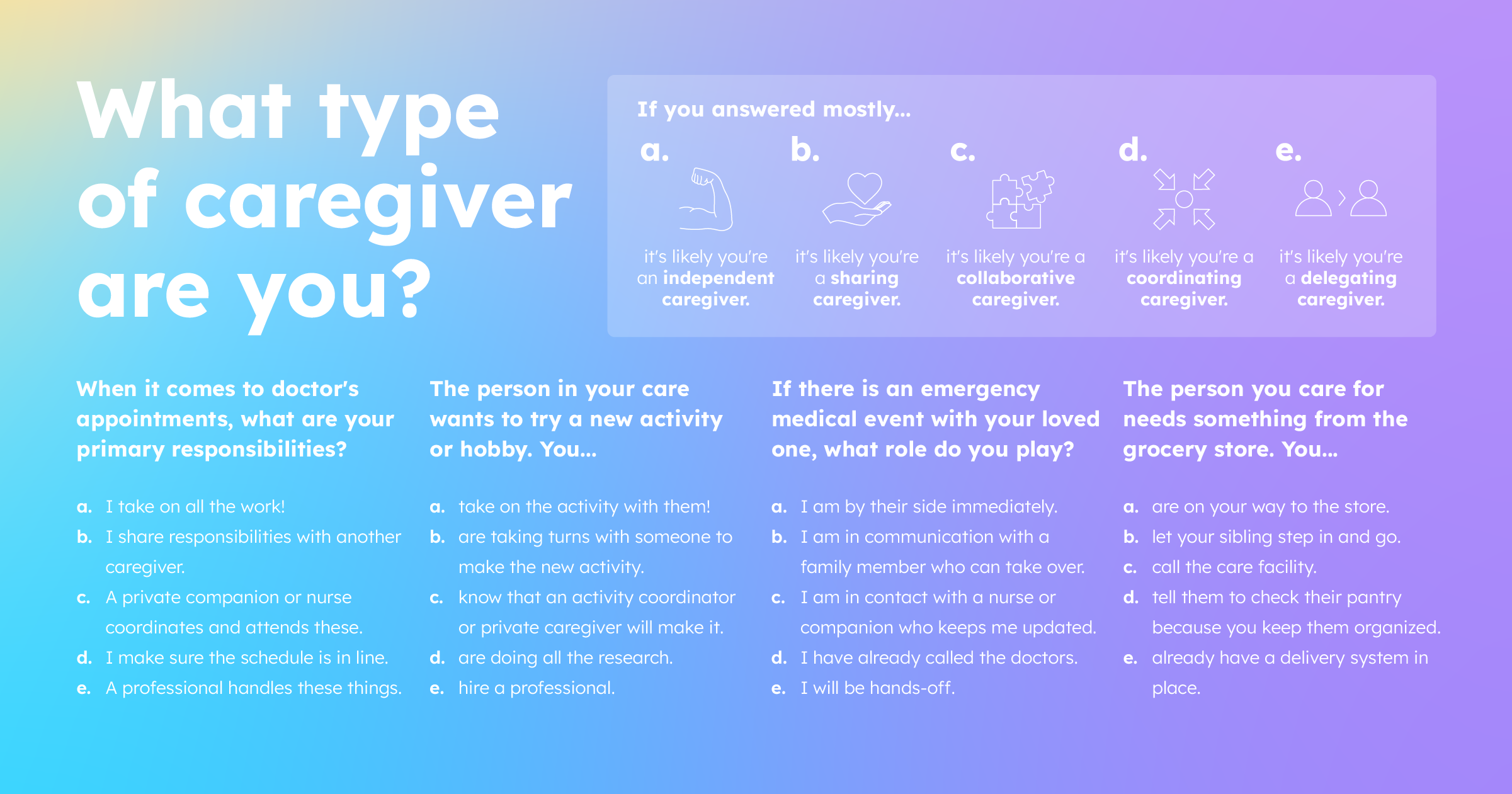Adapted from The Successful Caregiver's Guide by Rick Lauber
Whether it's a professional or a private endeavor, when taking on a caregiving role, most people fall into one of five categories. Author Rick Lauber breaks this down in his book, "The Successful Caregiver's Guide," sharing where each style of caregiving is successful and what we can learn from each other.
"By understanding your caregiving style, abilities, preferences, and physical location, you will be far better prepared to tackle tasks that come your way," explains Lauber, "and decide whether you want to leave them or delegate the jobs to someone else (who may be more willing and capable of doing the work than you)."

Answer these questions:
1. When it comes to doctor's appointments, what are your primary responsibilities?
a. I schedule the appointment, transport the person in my care, and communicate with the doctor. I take on all the work!
b. I share some of these responsibilities with another caregiver, so I am not the only coordinator or transportation for these appointments.
c. I don't go to every appointment. A private companion or nurse often coordinates and attends these for me.
d. I make sure the schedule is in line by setting up all the appointments after I have researched the doctors and exactly what my loved one may need.
e. Transporting the person in my care is not easy, and the language these doctors speak is often over my head. I have instructed a professional to handle these things, as they will know better than I do how to handle everything.
2. The person in your care wants to try a new activity or hobby. You...
a. take on the activity with them! You pick up any supplies they'll need, drive them wherever they'll need to be and stick around to make sure things go well.
b. are taking turns with a sibling or partner to make the new activity possible.
c. are glad because you know that a senior activity coordinator or private caregiver will make sure this new endeavor goes smoothly.
d. are doing all the research to find out if this is the best option for them or if there is something better. You're making phone calls to get all your questions answered before taking on the new endeavor.
e. coordinate transportation if necessary and hire a professional to walk them through this new endeavor.
3. If there is an emergency medical event with your loved one, what role do you play?
a. I am by their side immediately for assistance.
b. Either I am there immediately or I am in communication with my sibling or another family member who can take over.
c. I am in contact with a live-in nurse or companion who is keeping me updated on the situation until I can be there.
d. I have already called the necessary doctors, I'm reading through medical records and researching the best next steps.
e. I know that I am not equipped to handle the situation as well as the professional I have hired. Though I am available for support, I will be hands-off as emergencies are not my expertise.
4. The person you care for needs something from the grocery store. You...
a. are on your way to the store to pick it up.
b. just went to the store for them last week. Your sibling will step in and go this time.
c. call the care facility to see if they can send somebody to the store.
d. tell them to check their pantry because you keep them organized, and you know what they're looking for is already at home.
e. already have a delivery system in place so they have everything they need when they need it.
If you answered mostly 'a' it's likely you're an independent caregiver.
If you answered mostly 'b' it's likely you're a sharing caregiver.
If you answered mostly 'c' it's likely you're a collaborative caregiver.
If you answered mostly 'd' it's likely you're a coordinating caregiver.
If you answered mostly 'e' it's likely you're a delegating caregiver.
Here is a look at each type of caregiver, some strengths, weaknesses, and best practices going forward.
Independent caregiver
Typically adult children find themselves in this category. The independent caregiver may feel resistance to asking for help or sharing caregiving responsibilities. Sometimes they may feel and appear confident and in total control with handling all the important affairs.
"The truth of the matter is, independent caregivers will be stretched to their very limits and must become even more flexible with balancing their time and lives. Independent caregivers, more so than other types of caregivers, can be called on at a moment’s notice," says Lauber. Though adult children may feel more in control and comfortable as independent caregivers, it is not sustainable, and thus imperative to seek and secure the help of others.
Sharing caregiver
The sharing caregiver is on a team, able to collaborate and balance the responsibilities of caregiving and life outside of this role. Often siblings on good terms find themselves as sharing caregivers.
"This caregiving arrangement requires partnering, working together, and compromising," says Lauber. "It’s always easier to carry a heavy load with assistance. This works best if the family members live relatively close to each other and the parent."
Even if the caregiver doesn't have a partner in caregiving close by, some responsibilities can still be shared. For example, if one sibling is doing most of the driving and errands for a parent, a regular payment for gas or groceries is a simple way for a faraway sibling to help out. If it's available, a long-distance sibling may lighten the load by funding a grocery delivery service.
However this situation is handled, any extra help increases balance and truly benefits everybody.
Collaborative caregiver
A collaborative caregiver typically has a similar responsibility load to the sharing caregiver. Collaborative caregivers are resourceful and realistic. Lauber says those who fall into this category are the lucky ones.
Collaborative caregivers do participate in caregiving, but unlike the independent caregiver, they will have the necessary resources to call on many others to provide proper care.
"This is one of the best approaches with elder care as it is not a job to undertake independently," says Lauber.
Collaborative caregivers benefit from having some time away from caregiving duties, meaning they're better off when returning to the role.
Lauber shared this advice for all types of caregivers:
"If you are not a collaborative caregiver, try becoming more of one. Doing so is certainly advantageous because it will benefit your own physical and mental health. Your own workload will be reduced resulting in your not being as busy or emotionally taxed. Such an arrangement works well to help you ease your stress."
Learn how to create a collaborative caregiving circle here.
Coordinating caregiver
This is the type of person who researches, analyzes, and organizes everything. The coordinating caregiver wants to learn all they can about matters relevant to their loved one in order to choose the most appropriate course of action. This type of caregiver is hyper-organized; Lauber suggests there is likely a set of color-coded files in the coordinating caregiver's home.
"You will collect data and compare options such as researching medical advances, learning the possible side effects of prescribed medication, visiting long-term care facilities and assessing their suitability, or evaluating different models of motorized scooters," he says.
Delegating caregiver
The delegating caregiver runs a tight ship. This is the confident leader of several people who all care for one person. "This individual is the least hands-on because he or she assigns or hires people to provide the necessary care," says Lauber. "Bringing in someone else for support isn’t a bad thing at all; you may be uncomfortable with the necessary tasks or realize that others are infinitely more qualified (or have more time) to do some work than you are."
If it's possible, being a delegator can ensure safer practices when it comes to caregiving, especially when special medical care is needed. Delegating also immensely lightens the load of the caregiver. Learn here about the financial pros and cons of hiring help compared to taking on caregiving as a family member.
